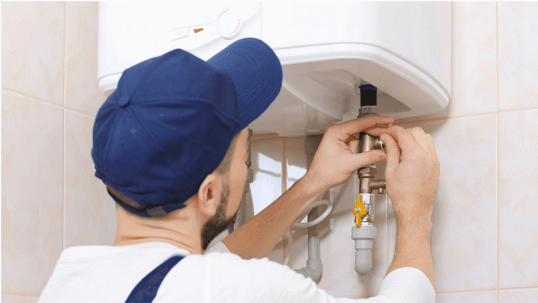We've noticed this great article relating to Common Problems with Your Home Water Heater below on the web and thought it made sense to share it with you on my blog.

Imagine beginning your day without your routine hot shower. That already sets an inadequate tone for the rest of your day.
Every home needs a dependable hot water heater, however just a few understand just how to take care of one. One very easy method to maintain your water heater in leading shape is to check for mistakes regularly and also repair them as quickly as they appear.
Bear in mind to switch off your hot water heater before smelling around for mistakes. These are the hot water heater faults you are most likely to run into.
Water as well warm or also cold
Every water heater has a thermostat that determines exactly how hot the water obtains. If the water entering into your house is as well warm regardless of establishing a hassle-free optimum temperature level, your thermostat may be defective.
On the other hand, too cold water may be due to a stopped working thermostat, a damaged circuit, or improper gas flow. As an example, if you use a gas water heater with a broken pilot light, you would obtain cold water, even if the thermostat remains in perfect problem. For electric heating systems, a blown fuse may be the wrongdoer.
Lukewarm water
Despite how high you established the thermostat, you won't get any kind of hot water out of a heating unit well past its prime. A hot water heater's efficiency might lower with time.
You will likewise get warm water if your pipelines have a cross connection. This indicates that when you activate a tap, hot water from the heating unit moves in alongside regular, cold water. A cross link is easy to spot. If your warm water faucets still run after closing the hot water heater valves, you have a cross link.
Unusual sounds
There are at the very least five sort of noises you can learn through a hot water heater, but one of the most common interpretation is that it's time for the hot water heater to retire.
Firstly, you need to recognize with the regular sounds a water heater makes. An electrical heating system may sound different from a gas-powered one.
Popping or banging sounds typically indicate there is a piece of debris in your containers, and also it's time to cleanse it out. On the other hand, whistling or hissing audios might just be your shutoffs letting some pressure off.
Water leaks
Leaks could originate from pipelines, water links, valves, or in the worst-case situation, the tank itself. Over time, water will certainly wear away the storage tank, as well as find its escape. If this occurs, you need to replace your hot water heater immediately.
However, prior to your modification your entire tank, make certain that all pipelines are in area and that each shutoff functions flawlessly. If you still need help identifying a leakage, call your plumber.
Rust-colored water
Rust-colored water indicates one of your hot water heater elements is corroded. Maybe the anode pole, or the container itself. Your plumber will have the ability to recognize which it is.
Inadequate hot water
Water heaters come in several dimensions, depending upon your hot water demands. If you lack hot water before every person has actually had a bath, your hot water heater is as well small for your family size. You need to think about installing a bigger water heater container or selecting a tankless water heater, which uses up less area and also is a lot more durable.
Discoloured Water
Corrosion is a significant reason for unclean or discoloured water. Corrosion within the water storage tank or a falling short anode rod might create this discolouration. The anode rod secures the container from rusting on the inside and should be examined annual. Without a rod or a properly operating anode pole, the hot water quickly wears away inside the storage tank. Contact a specialist water heater technician to figure out if replacing the anode pole will deal with the problem; otherwise, replace your hot water heater.
Conclusion
Preferably, your hot water heater can last ten years prior to you need a modification. Nonetheless, after the 10-year mark, you may experience any of these mistakes more on a regular basis. At this point, you need to include a brand-new water heater to your spending plan.
How To Troubleshoot 3 Common Water Heater Problems in Twin Cities
The Water Heater Is Leaking
- A leaky cold water inlet valve
- A loose pipe fitting
- A leaky temperature and pressure relief valve
- A corroded anode rod
- A cracked tank
Turn Off Your Water Heater:
- Shut off your gas water heater by turning the gas valve on the unit to the “OFF” position.
- Shut off your electric water by switching its power off at your electrical panel. Look for a two-pole breaker labeled “water heater” and turn it to the “OFF” position. Move the ball valve connected to the water heater to be perpendicular to the piping at a 90° angle.
Look for the Leak:
Depending on whether the water is coming from the tank's top or bottom, you’ll want to look for the leak in different locations.
If the leak comes from the top of the tank, carefully look for water escaping from the cold water inlet valve or loose pipe fittings. Rusted hot and cold water valves can have loose connections with the tank, with water leaking out of them.
https://mspplumbingheatingair.com/blog/how-to-troubleshoot-3-common-water-heater-problems
As a serious person who reads about Common Problems with Your Home Water Heater, I assumed sharing that excerpt was worthwhile. In case you liked our post kindly be sure to share it. We thank you for reading our article about Water Heaters Problems.
Hire A Pro
Comments on “Understanding Heater Issues To Be Aware Of”